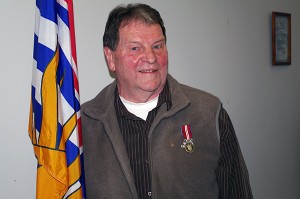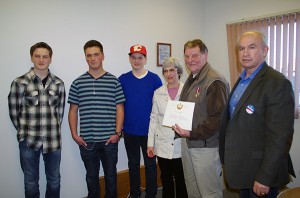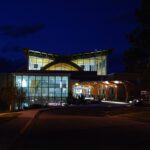Home »

Carmen Purdy honoured with QDJM
One of the more controversial figures in the history of Kootenays conservation was honoured last week with a Queen Elizabeth II Diamond Jubilee Medal.
Kootenay East MLA and cabinet minister Bill Bennett presented Cranbrook resident Carmen Purdy with the medal March 26.
From helping create the Habitat Conservation Fund to feeding starving elk against the wishes of government to two decades sitting on the board of the B.C. Nature Trust, as well as other conservation organizations, to being a member of the regional Agricultural Land Commission panel to simply not following in the well-trod path, Purdy has charted his own course.
 He is loved; he is hated. He doesn’t care.
He is loved; he is hated. He doesn’t care.
“I’ve known Carmen since I moved to Cranbrook and he’s introduced me to many, many people in the conservation field around here and Carmen Purdy, to quote from FJ Hurtak, has done more than any person in the whole Kootenay region for wildlife habitat,” Bennett said. “If you go up and down this valley and go over into the Elk Valley and start naming the private properties that were acquired by the Nature Trust,” he has been involved.
On the Nature Trust board for 20 years, Purdy played a role in the it obtaining such properties as Cherry Creek (Meadowbrook), the Hofert Property (over 10,000 acres on west side of Lake Windermere), Big Ranch (in the Elk Valley) as well as a host of properties in the Central (West) Kootenay. The Nature Trust currently manages 178 properties around the province.
“Another reason he deserves a medal is he’s raised his sons to understand conservation and understand wildlife and wildlife habitat and he’s raising his grandkids to do the same thing. When you think about it, what more important purpose can an individual have in life than that?” Bennett stated.
“He’s influenced thousands of people in the Kootenay region,” he said of the past president of the B.C. Wildlife Federation.
“One of the great presidents,” Bennett suggested. “If you ask anybody – they’ll tell you. Carmen, along with FJ Hurtak formed the Kootenay Wildlife Heritage Fund and they themselves have raised thousands and thousands of dollars for wildlife habitat.

“Carmen did some controversial things. If you know Carmen, he does what he thinks is right. He doesn’t do necessarily what other people think is right or what the rules are and he’s almost always right. He fed wildlife on a few winters when the Ministry of Environment said ‘oh no, no, don’t feed the elk.’ Carmen went out, arranged to get thousands of dollars in hay and fed the wildlife in the Elk Valley and over here in this valley and kept thousands of elk from starving to death. These were tough winters – long winters and they couldn’t get enough feed, especially later in the winter.”
Purdy said one of the things he is most proud of is when “five of us in Cranbrook, in 1979, established the Habitat Conservation Fund. There was the five of us in the room and the ministers of the day, ministers like Bill Bennett who really care about the resource, and we were able to get a hunting, fishing, trapping and guiding licence surcharge. That’s put together about $150 million – but it started right here, at the Inn of the South.
He explained that he and four other locals met with 12 ministers, including the likes of Bill Bennett Jr., Raif Mair, Jim Hewitt and long-time Columbia Valley MLA James Chabot and initially they lobbied for a tax on coal and wood “and they weren’t interested in taxing natural resources any further, so I said, ‘would you mind taxing our hunting, fishing, trapping and guiding licences?’”
A couple of the ministers weren’t interested, Purdy related, but then Agriculture Minister Hewitt said he thought it would work.
“So by 1981 we had the Habitat Conservation Fund (https://www.hctf.ca) formed – through government it takes a while,” he said.
Bennett said the fund still collects several million dollars a year for habitat in B.C.
“It just about got hi-jacked in the NDP era of the 1990s. We just about lost in,” Purdy said. “Not political at all. This is the truth. And at the same time Carol (his wife) thought I was going to jail for feeding the elk. In 1996/97, every day she thought they were coming to pick me up!”
That effort, which involved many residents from around the region, saved 5,000 elk and “that many deer” and sheep, Purdy reckoned. “That was the nucleus of building that herd again. We would have lost way more deer and elk at that time. The next spring I walked places where there was just bones and it was because they starved to death. I started feeding Nov. 15 but it had been snowing since about October 25 and it didn’t quit ‘til April.
“We had 11 feed sites going in the Elk Valley plus we had CP Rail using railroad vehicles and stuff and we were pushing these large bales that we had picked up out of Alberta, out of Olds, and it was export hay that was supposed to go to Japan but Japan’s economy had crashed so they had this hay. And we bought 1,000 tons the first time,” Purdy said, recalling the Kootenay Wildlife Heritage Fund had enough to cover the cost but outside sources also contributed.
“We were getting money from England, from school kids selling popcorn, from everybody in the community,” he said. And Rod and Gun Clubs from around the region provided much of the manpower to distribute the hay.
“It was lots of work – six days a week, from six in the morning to midnight,” Purdy said.
“The interesting part of that is when we fed off the railroad tracks we quit running over elk,” he said.
The effort put forth by people in the region at the time was incredible, Purdy said, recalling how when they were taking hay to Big Ranch, ‘volunteers needed’ posters were tacked up at the mines and help arrived in droves.
“Not one guy had to work twice in 120 days. That’s the kind of support that we had in the valley. And it was the same here. Ranchers – I can’t say enough about Barry Miner. He used his truck without payment for the whole period of time we were feeding. He deserves a medal himself.”
Purdy said he didn’t worry about government being ticked off that he led a feeding wildlife campaign.
“They wanted nature to take its course, but you know, with wildlife, starvation is not an option. We’re civilized; we shouldn’t be allowing wildlife on traditional winter ranges to be in a position where they are starving. You’ve got to have good management – no question – but there’s times when it’s significant that we step forward and look after those critters; because it’s a big industry. In Canada the wildlife industry is equivalent to agriculture. It’s a $12 billion a year industry in Canada, fish and wildlife. It doesn’t get the credit that it should get.”
 Carmen thanked his wife Carol for being “so patient and putting up with me over those times – because there were times where she said ‘you are going to go to jail for sure,’” he laughed.
Carmen thanked his wife Carol for being “so patient and putting up with me over those times – because there were times where she said ‘you are going to go to jail for sure,’” he laughed.
Bennett shared: “a perspective of Carmen’s that I’ve always admired is you can be a friend to wildlife, a friend to wildlife habitat and a friend of nature without being opposed to all development, without being opposed to mining, without being opposed to forestry, without being opposed to resort development; it’s possible for these activities to exist on the land as long as you manage. There are a lot of species that actually benefit from that activity.”
Opposed to creating more parks, such as in the Flathead, Purdy backs available access to the backcountry.
“It’s not just hunters that use access. It’s the prospector, it’s the guy who wants to go out into the backcountry with his family, it’s the huckleberry picker, it’s guys who are trappers, it’s the whole community needs access to Crown land. We have 5.2 million acres in parks and wilderness areas in the Kootenay-Columbia. If anybody gets excited about wanting to be alone I can drop him off in the Purcell Wilderness Conservancy and spin him around three times and we’d probably never see him again. We’ve got enough of that. So when I see what’s happening in parks, it’s just a ‘no-go’ zone; ‘it’s for our futures, for our kids.’ What, so they can’t use it either? Most of those places have too many damned rules around what they do and to me, as a good steward – Genesis 1 – 28 to 32 tells you what you are supposed to be as a man who is a steward of the land and a steward of other things around him and so if you go back to Biblical principles it tells you what we should be doing. It doesn’t mean that we abuse it with access but we certainly use it.”
That said, Purdy said he also doesn’t believe in blanket access.
“I don’t believe you should be able to access everything, either, in terms of using all of man’s modern equipment and machines. I believe in access on hard surface roads is totally fine, no matter, anytime of the year. I don’t believe that people should be running quads over alpine basins and up these steep hills. That’s abuse; that’s not use. I see it every time I go out of Cranbrook here – on Eager Hills.”
Looking at his three grandsons Cam and Lucas Purdy and Angus Hamilton, who attended the ceremony at Bennett’s Cranbrook office, Purdy said, “I want access for these young fellas, to be able to go play but I don’t want them to abuse the land, either. It’s not about abuse; it’s about how you use it. If you use it wisely it will be there forever. Wise use is really the responsibility of everybody. Good stewardship just sums it all up if you do it right you can multiply resources in every area.”
Bennett said Purdy has led by example.
“Carmen has done more for wildlife and wildlife habitat than any member of Wildsight. Parks aren’t necessarily good for wildlife,” he said. “There’s this myth that just make a park and everything in the park boundaries will be healthy and just wonderful; it’s not true.”
Purdy said he opposes the creation of a park of any kind in the Flathead River area in the southeastern corner of the province.
‘It boils my blood,” he said, “We don’t need a park in the Flathead and neither do the grizzly bears. The worst place in the world for a grizzly bear is in a park and that’s proven scientifically. We should be taking the Akamina-Kishinena (https://www.env.gov.bc.ca/bcparks/explore/parkpgs/akamina/)out of park status as far as I am concerned. “
Purdy found the spark for active conservation while growing up beside “a little creek in the West Kootenay. I had good peers; older men who I really looked up to in my life and had influence on me. Presidents of rod and gun clubs in Nelson and Trail and a Beaver Valley outdoorsman who took me under his wing when I was about 10 years old and he taught me all kinds of interesting things about the outdoors and resource use. He ended up in Parks – and this guy was a lumberjack – a logger, a hunter, he did a lot of things a lot of parks people wouldn’t do today. Through him I met other people who were important, so I kind of got a passion for it. I’ve always loved to hunt and fish and so having that in my background I felt that you always have to put something back – you can’t just take.”
That eventually led him to him to the presidency of the East Kootenay Wildlife Association for 10 years, while living in Kimberley.
Purdy was also involved with Scouts Canada, as a Scout and Cubs leader.
“I had some peers who were really good men and they interested me in the outdoors and how it works.”
While working in the mining industry he met “lots of really good people there – just grassroots people who had their feet on the ground and understood where wealth came from. Only wealthy nations can do what we do here. Poverty is not good for the environment and the only way we make wealth in Canada – real wealth – is using our natural resources wisely.”
Purdy said noted educator and inaugural chair of the Habitat Conservation Fund’s public advisory committee Ian McTaggart-Cowan was also an important influence.
He recalled a time when McTaggart-Cowan told him that he had conducted a study following fires in the Broadwood and Ram Creek in the mid 1930s and it showed that bull trout would never return.
“There will never be another bull trout in the system,” McTaggart-Cowan told Purdy. ”And today there are more bull trout than we’ve ever had. One of the most significant conservation things that ever happened in this valley was when a dyslexic summer student released 250,000 cutthroat into the Bull River, off the Bull River fish hatchery and filled the reservoir with sockeye,” Purdy said.
Having spent most of his 72 years on the land and waters of the Kootenays, Purdy is a treasure trove of vignettes and stories.
And never afraid to speak his mind, he is still ruffling feathers and preaching common sense.
“We don’t always agree, by the way. It’s not necessary to always agree,” Bennett admitted after pinning the medal to Purdy’s chest, while his grandsons and wife stood proudly by.
Ian Cobb/e-KNOW







